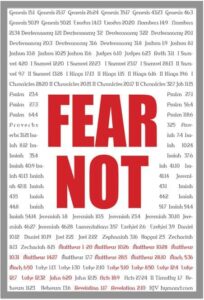Granted: The Bible’s stance on violence is ambiguous at best. That’s why if you read it as a Biblicist, as Pete describes it, you might genuinely think God wants us to violently defend our nation-state against foreign enemies. I mean, it is right there in the Bible. Alternatively, if you read it as a Red-Letter Christian, who feels Jesus’ ethical stance trumps the implicit ethics of the Old Testament, you might think the Bible says we should “love our enemies” (presumably by not violently defending our nation-state against them).
Of course, the problem is that both are in our Bibles. So the Bible’s stance on violence really just depends on how you read it.
But that’s not true with fear.
Old Testament: Don’t be afraid.
New Testament: Don’t be afraid.
But we are so incredibly afraid.
So it seems appropriate to focus on that for a minute.
When it comes to fear, America has become the Woody-Allen-Character of cultures. Our anxiety oozes out of us at every Starbucks-owned corner. We’re afraid of Democrats winning another election, that the gays will overrun our society, that someone will take our kid, that someone will break into our car, that someone with a gun will shoot up whatever public space we find ourselves in, that our kid will get hurt, that we don’t have enough money, that Trump might win, and on and on, ad nauseam.
But that’s not the worst part. The worst part is how infrequently we admit our fear. And why would we admit it? To be afraid, as the Bible seems to be univocal about, is to mistrust God. And we can’t have a bunch of Christians confessing that they don’t trust God, now can we? No, we can’t. We’re even afraid to confess our fear.
So, we hide it behind other, more acceptable emotions and tasks, most of them summed up as:
“I’m just being safe.”
“I’m just being smart.”
“Better safe than sorry.”
So yes, “Be not afraid.”
But also, “Be not afraid to confess our fear.”
Because each time we convince ourselves that our fear is just “being smart,” we bury the root deeper and deeper into our hearts. We lose sight of the fear that motivates us and start buying the cover: that being afraid really is just being safe. And of course, it’s always better safe than sorry.
And the more we convince ourselves, the more we convince others. And our narrative reverberates to those around us. Yes, yes, we all begin to say. It’s not fear. It’s safety. And being safe is being smart. Right? Yes, yes, we all begin to say.
And eventually, “just being safe” can justify just about anything we need it to justify. “Just being safe” is what makes being consumed by fear seem like the most reasonable thing in the world.
So, yes, let’s all work toward “Be not afraid.” But in the meantime, may we all be very wary of making our fear reasonable.

